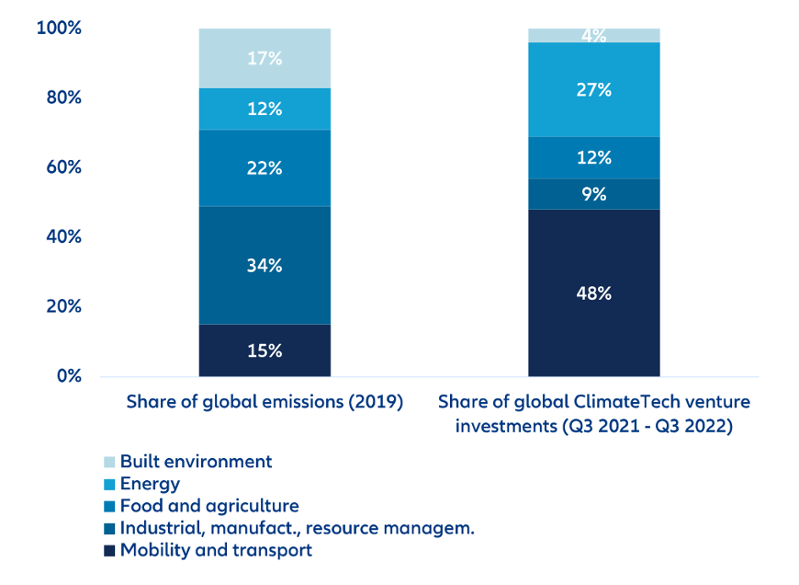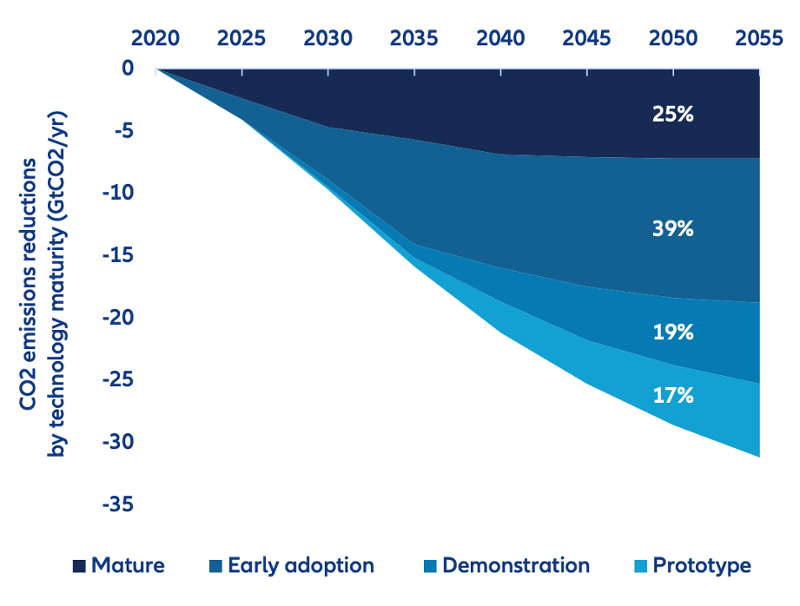In the urgent race towards a net-zero future, Europe finds itself at a pivotal crossroads. As the world collectively steers toward a green economy, the ClimateTech industry stands out as the linchpin for sustainable finance, presenting a substantial EUR600bn opportunity by 2030. Yet, our recent ClimateTech study—a collaborative one between Allianz Research, Allianz X, UnternehmerTUM, and UVC Partners—reveals a stark reality: Europe's current trajectory might not ensure a leading position in this burgeoning market.
The European ClimateTech industry, while burgeoning, faces a significant disparity between its potential and its current state. Europe, home to some of the most innovative minds and forward-thinking policies, needs to step up its game. The investment gap, standing at EUR700bn annually—EUR200bn in the energy sector alone—poses a clear challenge. The mismatch between emissions and funding distribution is evident; high-emission sectors lack essential support, hindering their decarbonization potential.
Funding the Future
European emissions versus funding development

Sources: PwC, Allianz Research
Closing this gap necessitates strategic and collaborative action. Venture capital (VC) and private equity (PE) investments have surged, with annual investments soaring to USD97.3bn in 2022. Europe, too, has made significant strides, securing 30% of global VC and PE funds. However, their distribution doesn't align with sectors needing the most transformation. Mobility and transport, which receive substantial funding, contribute far less to emissions compared to the underfunded manufacturing, agrifood, and building sectors. Bridging this gap demands a fundamental shift in investment focus, addressing not just emissions but the potential for meaningful change.
Nurturing Innovation
Yet, funding, crucial as it is, isn’t the sole driver of innovation. The backbone of our climate revolution lies in pioneering technologies. Presently, mature technologies can only contribute to 25% of the additional CO2 reductions required, highlighting the urgency for novel, disruptive innovations. Bridging the gap between these emerging technologies and investments necessitates creative solutions, such as blended financing and supportive public policies. It demands a dynamic ecosystem where ideas can flourish unencumbered.
The contribution of current versus emerging technologies to emission-reduction
Sources: IEA, Allianz Research
Crafting a Blueprint for Success
As well as funding and technology, the third and final pillar critical for the success of European ClimateTech is policy. That means streamlining bureaucracy and enhancing regulatory frameworks. We advocate for a unified European platform that simplifies access to both public and private funding, reducing the complexity startups face. By encouraging public utilities to invest in novel ClimateTech solutions, European countries can create a market pull, fostering innovation and driving demand for sustainable technologies.
Policy Recommendations for a Thriving Future. We propose a multifaceted approach:
1. Streamlined Funding: Simplify and expedite funding processes, reducing the gap between early and later-stage startups' development timelines.
2. Unified Platform: Establish a common EU platform for accessing public and private funding, fostering knowledge exchange and mutual learning.
3. Blended Financing: Encourage innovative funding structures, especially for deep tech applications, new markets, and climate transition in developing economies
4. Incentives for Innovation: Introduce tax benefits for early adopters, staged milestone-based subsidies, and founder-friendly non-dilutive public funding instruments.
5. Private Investment Mobilization: Increase fund-of-funds vehicles, attract more VC and PE funds from institutional investors, and facilitate consortium-building for ClimateTech investments.
6. Capital Market Access: Simplify bureaucratic hurdles for listings, establish a European ClimateTech index, and promote European tech companies for future IPOs.
7. Research Ecosystem Collaboration: Increase R&D budgets for universities, facilitate research-based ClimateTech investments, and create a collaborative ClimateTech ecosystem around research institutions.
In essence, Europe's success in the ClimateTech industry hinges on strategic, collaborative, and swift action. The time for transformative change is now. By aligning funding with potential, reducing bureaucratic obstacles, and fostering innovation, Europe can not only secure its position in the global ClimateTech race but also pioneer the way toward a sustainable, net-zero future.




















